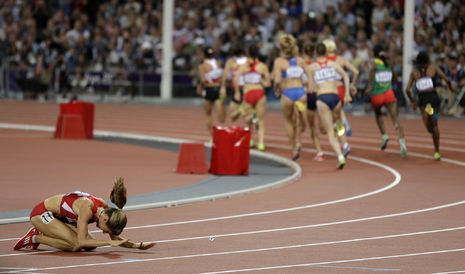Illness and Fame: What do you do when your Olympic dreams fall through?
Recounting the story of her sister’s illness, Miranda Stephenson discusses the double-edged sword of childhood sporting success.

When I was growing up, my family was an 'Athletics Family'. Perhaps what is more accurate to say is that my sister was a star. Her, sprinting round the universe in golden spikes. Us, gazing up at her trailblazing, wondering whether it was lightning we’d just witnessed, or if it was the hand of God.
She ran her first race at the age of eight, and was scouted by a local athletics coach. By 2014, she was ranked first in the UK for her age category in 600m. In 2015, regardless of age category, she had made the top 50 in the country. Her talent was prodigious; she was the youngest runner on that list. That same year she was the fastest in her age category for 1000m and third in the 800m.
My father took his coaching qualifications; the two of them were up at 6 in the morning to train before my sister went to school. They had a very close relationship. Like many parents, my dad likes success, and my sister was successful.
Somewhere along the line, our lives began looping like the cyclical oval of a running track. My sister won, and kept on winning. She was in the newspaper so often that it ceased to be a novelty, and was given special access to closed tracks. Her birthday cake was specially commissioned: a marzipan miniature version of her, ready to receive its marzipan medal.
People travelled across the country for a chance to race against her and she was always very gracious in congratulating everyone she’d beaten. You’ll find that lots of people want to talk to the fastest girl in Britain.
Sometimes, people gave her presents. I was jealous in a childish way – the same way that I was jealous of my brother’s heap of bright new toys, way back during his kidney operation.
At one athletics meet, my sister told a man that she liked his Superman socks. The next time we saw him, his wife was there to give her some Superman socks of her own. She wore those socks and won; they had a little red cape stitched onto the back of them, which danced in the wind in presumptuous celebration. My sister never lost.
“What was the point of taking me to karate, when running was so much more exciting? We were an Athletics Family, after all.”
My siblings and I always attended the same schools. During assemblies, she’d be routinely hauled up to the front of the hall to let everyone applaud her latest success stories.
When she tried out to become House Captain, she took in her gold medals to use as props. She got the role, of course: as I said, my sister never lost. If so much as a board game didn’t go her way, she’d storm from the room in a fit of bubbling fury. If her pawn died in Risk, it could have been her great-grandmother.
I don’t know exactly when it happened, but in the process of raising my sister, my parents had stumbled on the “meaning of life”. Its name was Running, and, like it or not, we were all on this earth to pay our respects.
At mealtimes, our conversation was peppered with “Jenny Meadows” and “Paula Radcliffe” and salted with intricate analysis of PBs. My mother didn’t run but she was my sister’s biggest fan.
My brother and I loped tearfully around cross-country courses in her wake. My own participation in competitions was mostly forced. One time, I threw myself painfully onto the floor to pretend that I had fainted. Another time, I locked myself in a dingy Portaloo, delaying the start of the race by ten minutes. Every time, it didn't work. Many times, I wept.
As soon as I was old enough, I started doing karate instead. Even after I’d started competing, I often felt guilty about asking my parents to take me to gradings or training workshops. What was the point of taking me to karate, when running was so much more exciting? We were an Athletics Family, after all. I was a triple medallist at the student national championships, but I was never going to be a star.
During the 2012 Olympics, we had the TV on almost every hour of the day. It’s history, my dad said, but what other people said was, This is where your sister is going to compete. It was the natural course of things.
First would be the Commonwealth Games, her coach had confided. That was supposed to be 2018. Then she’d be ready for the 2020 Olympics, where she’d run the 800 metres. I privately wondered if she’d be ready sooner: all this talk swam sweetly around her, fumbling after her siren song. Fame of any kind is intoxicating.
"Everything that she had known, every certainty in her world, was ground into the dust by the spikes that people who were starting to overtake her wore"
By the time of 2016’s Rio Olympics, though, no one was saying much of anything. My sister had severe anaemia. Her times bloated: gossip flared up and faded away. Many people were kind.
Everything that she had known, every certainty in her world, was ground into the dust by the spikes that people who were starting to overtake her wore. People that had been slower than her. People that had been her friends but now didn’t seem to want to talk to her.
Her best friend at the time once pretended to be ill rather than meet my sister in town. Later that day, she posted on Snapchat that she’d been sand-dune running instead. Lots of people had wanted to talk to the fastest girl in Britain, and sometimes people had wanted to use her, too. It was all coming out in the wash.
My sister became depressed. She had a new coach, and he didn’t understand her. He’d seen her times; she was very fast; he had her training with the boys her age. She was pushing herself so hard that she’d throw up after every session, and it became a kind of joke within her running group. My sister had never been the kind of girl who became the butt of a joke. When she didn’t do well in competitions, other parents would tell her that she needed to try more.
Our parents stopped going to see her races. Eventually, she stopped running altogether.
What do you do, when illness jump-tackles your dreams in their tracks? My sister can tell you: it’s a long process. In the past, I had spent many lonely afternoons hunched up in the stands for her competitions. I’d wished that we didn’t have to be an Athletics Family anymore; I’d wanted my mum and dad to spin out my successes over multiple dinner times. That was before I knew how my sister would close in on herself; how she would cry.
Recovery takes time.
First, she started fencing. Next, dressmaking: she makes her own clothes now. She’s very talented, although there’s only so much opportunity for glory by way of a needle and thread.
Later - just over two years ago - my dad helped to found a new athletics club, and my sister volunteers there as an assistant coach. She talks to me animatedly about her session plans; waves her hands around like pale wings, happy that the teenagers are growing into their potential. She’s a good coach.
Of course she is. I used to think that she just cared about running, but now I see that she cares about people, too. Running is a glue that binds her to others. It’s the love of her life.
When she dares, she still dreams of competing. She’s started running every Saturday morning, has begun to stretch every night before bed. What she’s really searching for isn’t a medal anymore, but a feeling. It doesn’t have to be in running- it could be in anything. But there’s an elation that she’s known, which used to visit her often, although she hadn’t felt it for a strange, long time.
In her dreams she’s soaring down the final straight, remembering how it felt to be that familiar girl with dark hair and green eyes at the end of a race. She kicks - and despite all of that illness and fatigue, her feet skim through the air - and she’s flying. There’s a wave of indistinct noise from the stands, crashing down behind her as she rises to it, runs on water, fast and light enough to make Jesus sit up and rub his eyes. She crosses the finish line. Shrieks for joy.
I hope, one day, she opens her eyes and sees that crowd again.
 News / Cambridge academics stand out in King’s 2026 Honours List2 January 2026
News / Cambridge academics stand out in King’s 2026 Honours List2 January 2026 Interviews / You don’t need to peak at Cambridge, says Robin Harding31 December 2025
Interviews / You don’t need to peak at Cambridge, says Robin Harding31 December 2025 Comment / What happened to men at Cambridge?31 December 2025
Comment / What happened to men at Cambridge?31 December 2025 News / Varsity’s biggest stories of 202531 December 2025
News / Varsity’s biggest stories of 202531 December 2025 Features / “It’s a momentary expression of rage”: reforming democracy from Cambridge4 January 2026
Features / “It’s a momentary expression of rage”: reforming democracy from Cambridge4 January 2026










